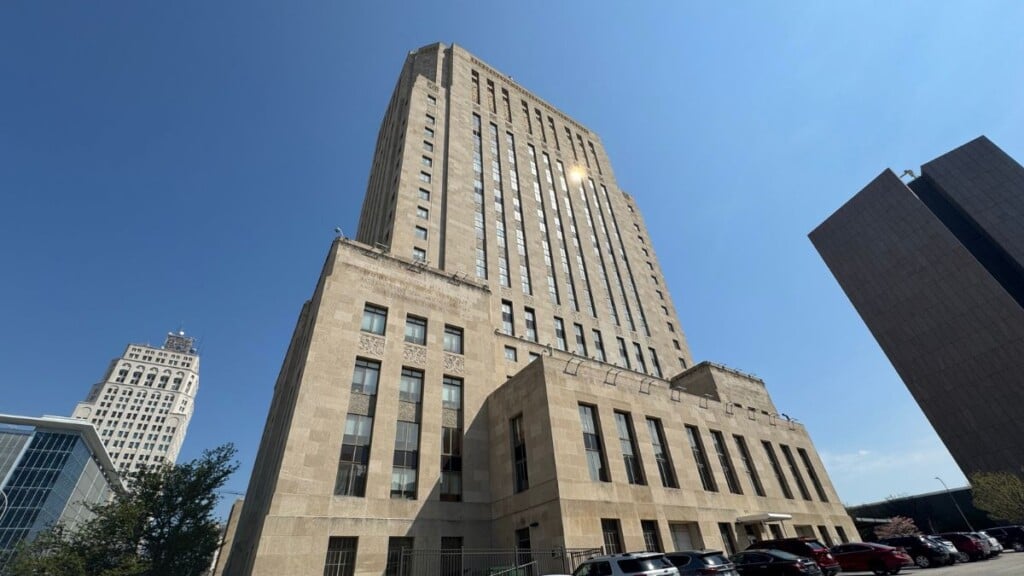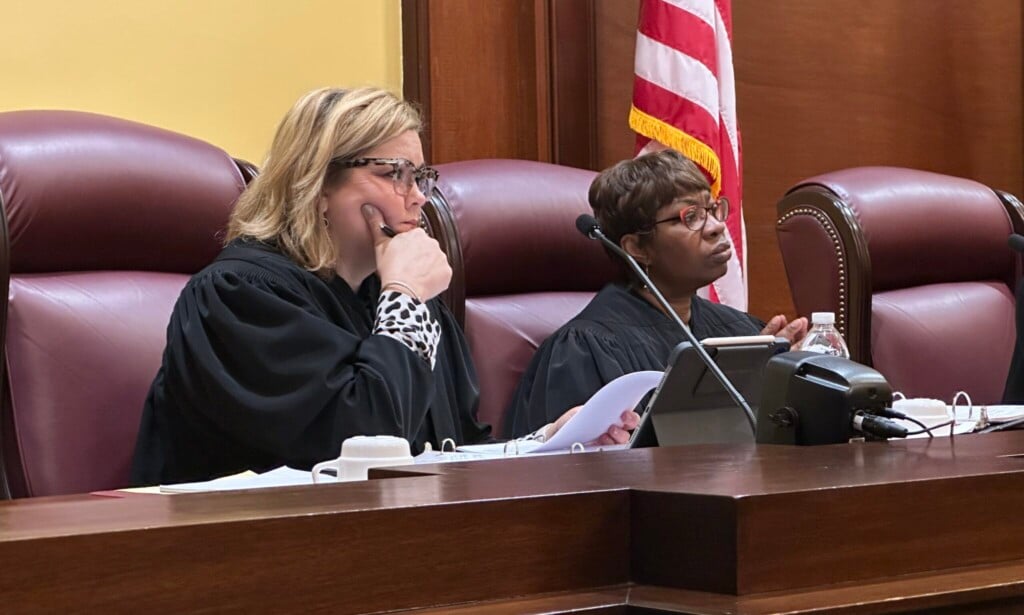The Pitch’s June 2023 election preview evaluates the candidates from KC—and a dude from Bedford, VA?
The ballot is shorter than most, but this upcoming municipal election on June 20 represents a vast shuffle in what Kansas City’s future could look like.
Here is your Pitch cheat-sheet on what’s at stake, beginning with a list of key issues and developments the next class of the city council is expected to address:
Some factors to keep in mind:
—At-Large candidates hail from the district in which they are running, however those elections will be open to all city residents to weigh in on.
—The previous April 4 primary election narrowed down each race to just two candidates. In some cases, those polling numbers from that race will be included for perspective. Click here to see The Pitch’s recap of that primary.
—Each candidate’s name below is linked to their official campaign site, where one can dive deeper into their platform.
—New district maps, drawn in 2020, can be reviewed here.
Several (but not all) of the key issues:
—Affordable housing & houselessness
—Record violent crime and homicide rates
—Infrastructure improvements (streets, sidewalks, sewers, etc)
—Royals Stadium
—The 2026 World Cup
—The need for a new city jail (the Jackson County Detention Center is now under construction, but will house very few, if any, city inmates).
—Transportation services & streetcar extension
—Sustainable living wages and job creation
—Trash, waste removal, and other basic city services
—Addressing pockets of neighborhood blight and filling vacant businesses
Kansas City Mayor:
Incumbent Quinton Lucas pulled 81.5% (or 35,351 votes) over perennial candidate Clay Chastain’s 18.5% (8,026) in the April 4 primary.
Lucas is almost certainly sure to win, though Chastain has ran several times in the past and garnered attention both for his lack of true Kansas City residency (he lives in Bedford, VA, currently, as his daughter attends school in the area), though he does also hold a residence in town where his sister resides.
Chastain had become relatively well-known last decade, urging petitions to keep Union Station from being demolished and regularly advocating for greater transportation and a light rail in the city. Lucas has almost wholly ignored any chances to directly remark on Chastain, though the latter’s efforts to recall Lucas and Kathryn Shields in 2020 certainly must’ve lit a dislike between the two.
Lucas’ record is well known.
At-Large 1st District:
Incumbent Kevin O’Neill earned 65.54% (27,254 votes) ahead of insurance agent Ronda Smith (20.34%) in the April 4 primary election.
O’Neill, 66, is a first-term incumbent and lifelong resident of the city with powerful backing from union sectors. He previously served as the longstanding editor of The Labor Beacon newspaper.
Though he supports local control of the police department, O’Neill has said he wants to see short and long term plans developed on the issue of crime. On state control he has said, “if it worked so well then cities would be clamoring to change their system to ours.”
“Pitting mental health services against cops on the ground is a false choice,” he says. “We should also consider deployment strategies that help us use existing funds more efficiently. For example, we should look at how many sworn officers are doing administrative work.”
Ronda Smith, 57, is the wife of a 26 year veteran of the KCPD and a real-estate agent who only recently became active in area politics.
“For many, many years, I just stayed in the background and let him be the political guy. And then in 2018 and 2019, I started noticing some things that I wasn’t very happy with,” Smith says.
She lists three pillars on her decision to run: trust, safety and infrastructure, and liberty. “I am devoted to defending citizens and businesses from tyrannical mandates that go against our rights as Americans,” she writes on her website.
“The majority of police officers do it because they care and they want to help. Not because they’re doing it to be rich and have a power over somebody just to say, ‘I’m gonna put you in jail’. Division is not good for work. When you do that to people it breaks their spirit and the morale and then they feel like they’re not wanting to stay,” Smith says, before admitting that “of course, there are bad people in every profession that need to be weeded out—and that’s that needs to be done, too.”
At-Large 2nd District:
Lindsay French, 41, a graphic designer and communications specialist and the Chair of the Planning and Development Committee for the Northland Regional Chamber of Commerce, earned 47.12% of the primary vote ahead of KC Tenants leader Jenay Manley, 30, at 34.42%. The pair is vying to replace second-term incumbent, Teresa Loar, who did not seek reelection.
French is well-educated, and holds a number of positions on city and neighorhood commissions and other organizations. Her analytical take on issues lends itself to a desire to see more regional approaches to problem-solving penned in a series of unique plans. This would increase efficiency and actually help the people on the ground much quicker than a blanket strategy for issues such as houselessness and crime.
Manley, a mother of two who had had to flee her abuser in favor of camps and cabins for a period to keep food on the table, became active with the KC Tenants over three years ago. After a dense period of activism in that space, Manley decided to run for city council as one of a number of KC Tenants Power backed candidates because “it became clear that no matter how hard we work or deeply sacrifice, poor and working-class people can only thrive if the people in power are making decisions that prioritize our needs.”
At-Large 3rd District:
One of the largest shakeups in the April 4 primary results was the rise of upstart candidate Melissa Patterson Hazley, 44, an educational psychologist and researcher at UMKC and graduate of Southwest High School, who pulled 62.69% (25,134 votes), ahead of first-term incumbent and former state representative and House Minority Whip, Brandon R. Ellington’s 37.31%. Ellington, 42, has held this seat since 2019.
Hazley has gathered enough backing to make Ellington admit that he is still the outsider in this race. The latter is an outspoken supporter of greater housing efforts from the city and for criminal justice reform. Hazley has also supported a greater focus on housing issues, but also looks to emphasize development done with a greater emphasis on neighborhoods and regions in order to allocate city spending more effectively.
3rd District:
Melissa Robinson, the incumbent, began her career as the Director of Crisis Intervention with the Ad Hoc Group Against Crime and serves as the president of the Black Health Care Coalition. A UMKC grad, a large portion of Robinsons efforts, in addition to healthcare, involve education. Here, her focus is “high student expectations, classroom focused finance, parent leadership and community engagement.” Robinson also supports “city-supported capital stack, including the central-city sales tax, community block grants, housing trust funds and tax abatements. Factors she says has played into legislation she has and is working on.
Sheri “Purpose” Hall, is the CEO of Poetry for Personal Power, a nonprofit addressing mental health needs through the arts, and also the founder of the East of Red ArtHouse and PenFire Publishing. “Her philosophy on activism, mental health, and community work is that lived experience is paramount. She also believes recovery from all things including trauma is possible,” reads Hall’s website.
At-Large 4th District:
Crispin Rea, 37, was born and raised on the city’s East Side and is a lawyer and seven-year veteran at the Jackson County Prosecutor’s Office Special Victims Unit. Rea earned 36.16% in the primary ahead of Justin M. Short (21.46%).
Short, 34, is a Mizzou grad from the Northland who now resides downtown, grew up watching his father as a Platte County Commissioner and was in the hospitality industry for many years prior to getting involved in the political fold. Short has been a member of the LGBTQ+ Commission since 2020.
The pair finished ahead of a crowded five-person race to see who will succeed two-time incumbent Katheryn Shields.
4th District:
Eric Bunch, the incumbent Midtown resident and experienced transportation and housing advocate, survived a failed recall push from a police-backed PAC in 2021.
A supporter of the People’s Housing Trust Fund, Bunch faces a challenge from Henry C. Rizzo, a former state representative and 40-year Columbus Park resident, whose campaign slogan “Back to Basics” offers a less ambiguous contrast to Bunch’s relative progressivism. Rizzo, for example, supports offering developer incentives and working with local agencies to combat the city’s housing issues. Both candidates support local control.
5th District:
Ryana Parks-Shaw (unopposed)
At-Large 5th District:
One of the closest primary races that looks to again come down to the wire, Darrell Curls took 35.66% of the April 4 primary total over Michael Kelley’s 33.59%, a margin of just over 800 votes, while Theresa Cass-Galvin earned just over 30% following a 2022 campaign for Jackson County Executive that nearly saw her defeating Frank White Jr.
Curls, 64, is a political regular as the son of the Freedom Inc. founder, Fred Curls, and the uncle of former Missouri State Senator, KiKi Curls. A recently retired Ford Motor Company employee, Curls has also served as a former Hickman Mills School District School Board Director. Curls looks to reduce crime, improve city services, build and renovate housing stock in the city, and create more jobs with a living wage.
Kelley, 31, is well-known as the director for BikeWalk KC as well as a Gregory Hills neighborhood resident near Swope Park. Curls is the more conservative of the two, while still leaning slightly-left-of-center as opposed to Kelley, who says “we are at a key juncture on key issues such as health, infrastructure, housing and climate.”
At-Large 6th District:
Andrea Bough, 51, the incumbent, has a law degree from UMKC and resides in Brookside. She took 61.39% (25,550 votes) on April 4 to poll ahead of former public school educator Jill Sasse (21.43%), 62, a Waldo resident and former public school teacher who looks to be a “common sense candidate” in the same vein as Ronda Smith.
The contrasts between the two are evident, but not as stark as some of the other races. Smith wants to further enforce houseless camps, recruit more offers, and establish licenses for panhandling. Bough, supports establishment-style plans like KC360 (crime prevention) and the Zero KC Plan (houselessness). Both would like to bring more business and development to the further reaches of the city’s southern end.
6th District:
Dan T. Tarwater III, 59 and a Red Bridge-area resident, spent 28 years as a Jackson County Legislator, but now has his sights set on city issues. He took 45.54% of the April 4 primary vote to win a five-way race over veteran and KC Tenants Power-sponsored runner-up Johnathan Duncan (24%). The winner will replace Kevin McManus, who has hit his term limit.
One of Tarwater’s most authoritative issues stems around the city’s need for a new jail facility. In his final term on the Jackson County Legislature, Tarwater helped put together the county’s recently approved plan for a new Jackson County Detention Center. He had also been a supporter of mental health services programs for that facility, and believes the same efforts could help prevent houselessness.
Duncan, 37, a Newton, Kansas native and current resident of the 49/62 Neighborhood Coalition, looks to challenge Tarwater’s vast experience with a more progressive agenda. He is amongst the leadership of KC Tenants and also the Director of Operations for the Kansas City VFW. This cross appeal could help him in certain demographics.
Both Tarwater and Duncan want to continue to advocate for greater development in South Kansas City. The issue they differ most on is probably in the need for a city jail, as Duncan is generally opposed to the idea in favor of greater services towards prevention and rehabilitation.





